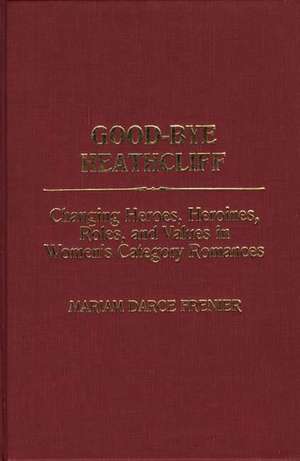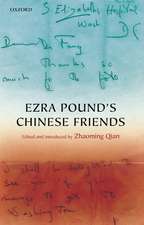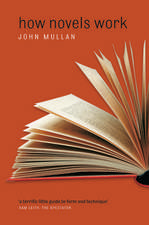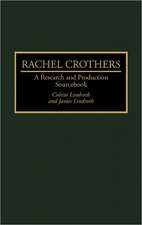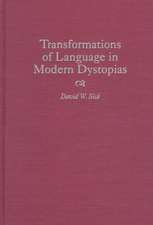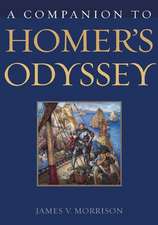Good-Bye Heathcliff: Changing Heroes, Heroines, Roles, and Values in Women's Category Romances: Contributions in Political Science, cartea 94
Autor Mariam Darce Frenieren Limba Engleză Hardback – 2 iun 1988
Virginal Heroines, young and naive but seething with passion, change sardonic heroes into loving, monogamous husbands. Such romance novel characters and themes have been transformed by the women's movement, argues history professor Frenier in this convincing, well-researched study. Frenier surveys earlier feminist studies of women's romances and traces the evolution of the romance industry, focusing on the competition between Harlequin's more traditional British writers and the American authors of Silhouette. She finds undertones of rape and violence in late 1970s novels giving way to more explicit and equal sexuality, to gentler, more nurturing heroes matched with stronger, more experienced heroines. By the late 1980s, premarital sex and women's careers are assumed in many novels, but the heroines greatest power remains her ability to inspire her hero to addictive, obsessive love . . . the subject is fascinating. "Booklist"
Now claiming an audience that includes nearly one-third of adult women in the United States, popular romance fiction is holding its own against competing media and has shown an ability to keep abreast of changing tastes. In the first recent book-length analysis of the subject, Frenier looks at developments in this literary genre in light of feminist issues and the pervasive social changes that continue to affect women in the post-World War II decades. Exploring traditional and more contemporary depictions of romantic heroines, as well as changing approaches to sexuality, she assesses the degree to which the values of the sexual revolution and women's movement have penetrated this form of popular culture.
Din seria Contributions in Political Science
-
 Preț: 212.35 lei
Preț: 212.35 lei - 35%
 Preț: 460.51 lei
Preț: 460.51 lei - 23%
 Preț: 171.48 lei
Preț: 171.48 lei - 51%
 Preț: 300.97 lei
Preț: 300.97 lei - 24%
 Preț: 464.24 lei
Preț: 464.24 lei - 42%
 Preț: 302.78 lei
Preț: 302.78 lei - 38%
 Preț: 439.77 lei
Preț: 439.77 lei - 27%
 Preț: 439.01 lei
Preț: 439.01 lei - 38%
 Preț: 442.13 lei
Preț: 442.13 lei - 43%
 Preț: 297.08 lei
Preț: 297.08 lei - 38%
 Preț: 439.51 lei
Preț: 439.51 lei - 33%
 Preț: 320.60 lei
Preț: 320.60 lei - 41%
 Preț: 328.13 lei
Preț: 328.13 lei - 24%
 Preț: 465.40 lei
Preț: 465.40 lei - 53%
 Preț: 381.77 lei
Preț: 381.77 lei - 38%
 Preț: 440.61 lei
Preț: 440.61 lei - 53%
 Preț: 367.93 lei
Preț: 367.93 lei - 42%
 Preț: 269.23 lei
Preț: 269.23 lei - 51%
 Preț: 304.19 lei
Preț: 304.19 lei - 52%
 Preț: 247.18 lei
Preț: 247.18 lei - 42%
 Preț: 321.02 lei
Preț: 321.02 lei - 43%
 Preț: 414.79 lei
Preț: 414.79 lei - 33%
 Preț: 321.44 lei
Preț: 321.44 lei - 52%
 Preț: 248.87 lei
Preț: 248.87 lei - 28%
 Preț: 362.62 lei
Preț: 362.62 lei - 23%
 Preț: 471.57 lei
Preț: 471.57 lei - 33%
 Preț: 320.31 lei
Preț: 320.31 lei - 34%
 Preț: 368.07 lei
Preț: 368.07 lei - 38%
 Preț: 206.27 lei
Preț: 206.27 lei - 38%
 Preț: 437.47 lei
Preț: 437.47 lei - 38%
 Preț: 438.00 lei
Preț: 438.00 lei - 38%
 Preț: 437.31 lei
Preț: 437.31 lei - 38%
 Preț: 345.49 lei
Preț: 345.49 lei - 38%
 Preț: 437.31 lei
Preț: 437.31 lei - 38%
 Preț: 436.99 lei
Preț: 436.99 lei - 38%
 Preț: 346.67 lei
Preț: 346.67 lei - 50%
 Preț: 305.89 lei
Preț: 305.89 lei - 38%
 Preț: 442.73 lei
Preț: 442.73 lei - 42%
 Preț: 252.57 lei
Preț: 252.57 lei - 38%
 Preț: 345.74 lei
Preț: 345.74 lei - 31%
 Preț: 284.72 lei
Preț: 284.72 lei - 27%
 Preț: 440.03 lei
Preț: 440.03 lei - 55%
 Preț: 150.08 lei
Preț: 150.08 lei - 38%
 Preț: 436.80 lei
Preț: 436.80 lei - 33%
 Preț: 321.35 lei
Preț: 321.35 lei - 38%
 Preț: 437.40 lei
Preț: 437.40 lei - 14%
 Preț: 355.15 lei
Preț: 355.15 lei - 28%
 Preț: 374.56 lei
Preț: 374.56 lei - 27%
 Preț: 364.06 lei
Preț: 364.06 lei - 42%
 Preț: 252.00 lei
Preț: 252.00 lei
Preț: 343.04 lei
Preț vechi: 554.77 lei
-38% Nou
65.66€ • 68.98$ • 55.18£
Carte tipărită la comandă
Livrare economică 12-26 martie
Specificații
ISBN-10: 0313260885
Pagini: 122
Dimensiuni: 140 x 216 x 10 mm
Greutate: 0.3 kg
Editura: Greenwood Press
Colecția Praeger
Seria Contributions in Political Science
Descriere
Now claiming an audience that includes nearly one-third of adult women in the United States, popular romance fiction is holding its own against competing media and has shown an ability to keep abreast of changing tastes. In the first recent book-length analysis of the subject, Frenier looks at developments in this literary genre in light of feminist issues and the pervasive social changes that continue to affect women in the post-World War II decades. Exploring traditional and more contemporary depictions of romantic heroines, as well as changing approaches to sexuality, she assesses the degree to which the values of the sexual revolution and women's movement have penetrated this form of popular culture.
